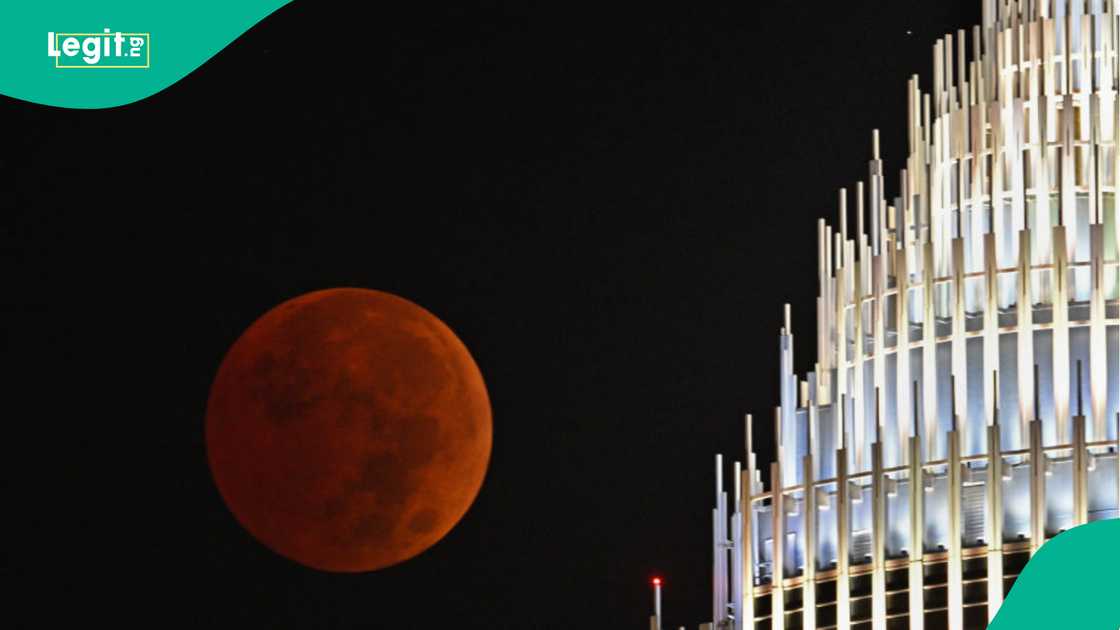Nigeria and Other Nations To Witness Lunar Eclipse, List Emerges
- Millions across Africa, including Nigeria, turned their eyes skyward on Sunday evening to witness a rare total lunar eclipse
- The celestial event, lasting approximately 83 minutes, was safely visible to the naked eye and marked a significant moment for skywatchers
- Experts confirmed that the eclipse was observable across much of the continent, with some regions enjoying an uninterrupted view of the spectacle
Nigeria and several other African nations were poised to witness a rare celestial event—a total lunar eclipse—on Sunday, 7th September.
The phenomenon, which began around 8 PM Nigerian time, was expected to last approximately 83 minutes, according to scientific forecasts.

Source: Getty Images
Experts confirmed that the eclipse would be observable across most of Africa, with certain regions enjoying an uninterrupted view of the entire event.
Countries including Nigeria, Ghana, Cameroon, Gabon, Equatorial Guinea, Benin, Togo, Niger, Chad, and São Tomé and Príncipe were among those listed to experience the eclipse in full or in part.
Western regions may miss early phases
Scientists noted that westernmost areas of the continent might miss portions of the early penumbral or partial phases due to the Moon rising closer to or during totality. Despite this, the spectacle remained accessible to millions across the continent.
Astronomers reassured the public that lunar eclipses are safe to observe without any protective equipment. “Scientists confirm that a lunar eclipse is safe to view with the unaided eye,” a statement read, encouraging widespread participation in the event.
What causes a total Lunar Eclipse?
A total lunar eclipse occurs when the Sun, Earth, and Moon align in space, with Earth positioned in the middle.
This alignment causes Earth’s shadow to fall on the Moon, temporarily darkening its surface and often casting a reddish hue.
During a total lunar eclipse, the Moon can appear reddish due to sunlight filtering through Earth’s atmosphere—a phenomenon often called a “blood moon.”

Read also
South-South diplomacy: What Tinubu’s Brazil visit means for Nigeria’s immediate economic needs
Unlike solar eclipses, lunar eclipses are safe to view with the naked eye. The event is visible from anywhere on Earth where the Moon is above the horizon at the time of the eclipse.
These celestial occurrences offer valuable opportunities for scientific observation and public engagement with astronomy, drawing widespread interest across continents.
The event drew attention from skywatchers and science enthusiasts alike, marking a significant moment for astronomical observation across Africa.

Source: Getty Images
NASA explains lunar eclipse 2025
Legit.ng earlier reported that on the night of March 13 or early in the morning on March 14, 2025, depending on the time zone, the Moon will pass into Earth's shadow, resulting in a total lunar eclipse.
This astronomical event will cause the Moon to appear red, a phenomenon often referred to as a "Blood Moon." According to NASA, a lunar eclipse occurs when the Sun, Earth, and Moon align so that the Moon passes into Earth's shadow.
In a total lunar eclipse, the entire Moon falls within the darkest part of Earth's shadow, known as the umbra, causing it to appear red-orange. This is due to the scattering of light, similar to the effects that make the sky blue and sunsets red.
Source: Legit.ng



